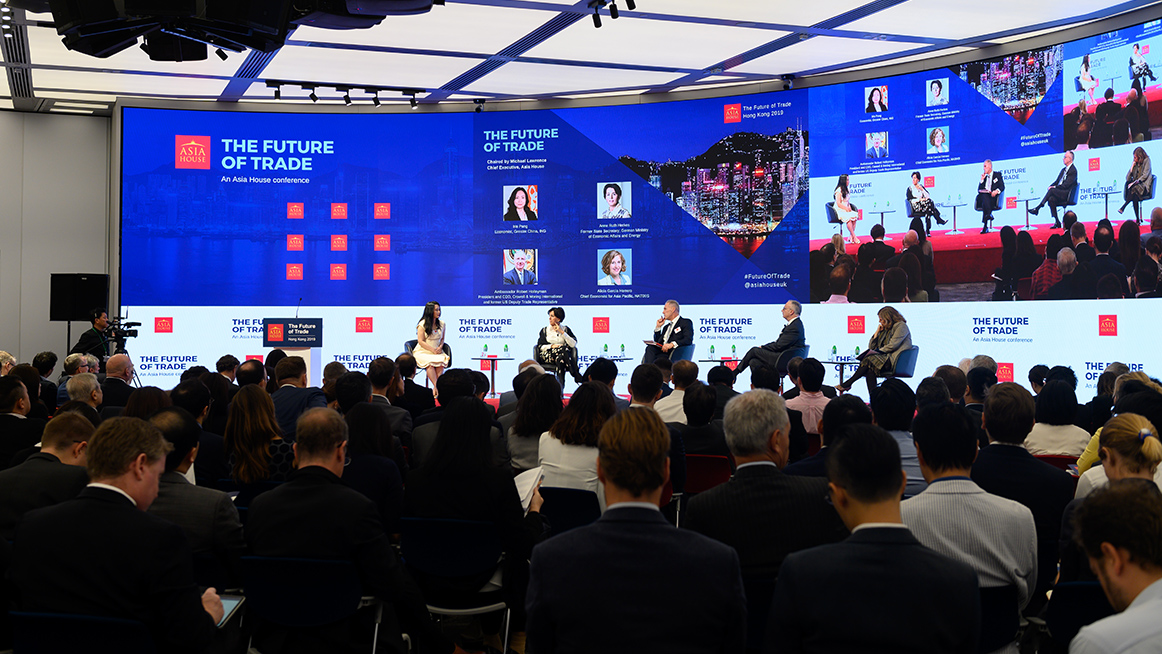Driving commercial and political engagement between Asia, the Middle East and Europe
Driving commercial and political engagement between Asia, the Middle East and Europe
Driving commercial and political engagement between Asia, the Middle East and Europe

The US-China trade war, slowing global growth and rising tensions over tech are creating disruption and uncertainty in world trade. The impact of these political and economic forces on global commerce was at the heart of the Asia House Future of Trade conference in Hong Kong, sponsored by InvestHK and HKEX.
The big story in world trade remains the US-China trade tensions. Despite a ‘phase one’ deal offering hope of a breakthrough, market sentiment remains gloomy, Alicia Garcia Herrero, Chief Economist for Asia Pacific, Natixis, suggested during a panel session at the conference.
“I would just call it a painkiller,” she said. “A painkiller is fine if you have a headache which is going to go away, but if you have a more serious illness, a painkiller’s not going to help you.” And according to Garcia Herrero, “we have a serious illness.”
The economist highlighted the scale and impact of the tariffs currently in place compared to the concessions discussed in the phase one deal. “We’re really talking about peanuts,” she said.
“We all know that this is structural and more is going to happen [outside the deal] that is not so positive for the ultimate outcome,” she added.
Asia House Chief Executive Michael Lawrence, chairing the discussion, shared a sense he had picked up from meetings with US officials on both sides of the public debate that anti-China sentiments are likely to endure in the US for some time. Ambassador Robert Holleyman, President and CEO of Crowell & Moring International and former Deputy US Trade Representative, agreed. But he also emphasised the increasing importance of data and how this will shape future conversations. “Data is the biggest driver in new discussions around trade,” he said.
This is playing out differently around the world, Holleyman argued. “We’re seeing a Chinese approach to data which is highly restrictive and state controlled, we see a EU approach which is not state controlled but is a very rigid approach to dealing with data, we see an ASEAN where the approach is largely open but where the rules are yet to be written… and then we see Hong Kong which probably has the model approach to data of any economy in the world.”
He cited the new Australia-Hong Kong agreement as “the most forward-looking” of any economy when it comes to data provisions.
Iris Pang, Economist, Greater China, ING Bank, broadly agreed, but took issue with the description of China as having a state-owned approach to data.
“Most of the tech companies are private companies that grew by themselves,” she said, sparking a lively flash point in the debate. When Holleyman retorted with the “very clear position” China has on how it seeks “to control how its citizens get data,” Pang argued that “if you don’t cross the line” in China, “you are free to do anything.”
Pang used the example of companies being able to use WhatsApp in China to illustrate the point. “I have a journalist friend in Beijing, and the first time she called me on WhatsApp I was so surprised,” she said. But companies can apply to use the platform, she said. “It is not totally cut off.”
Of course, there are other factors beyond US-China tensions creating uncertainty in the global trade system. Brexit remains an unanswered question.
Anne Ruth Herkes, former State Secretary at the German Federal Ministry for Economic Affairs and Energy, and member of the Asia House Advisory Board, expressed a willingness for matters to be resolved quickly. “I hope the elections in the UK produce a meaningful and sustainable result, and that we can jump ahead of the curve and start shaping the future relationship,” she said.
